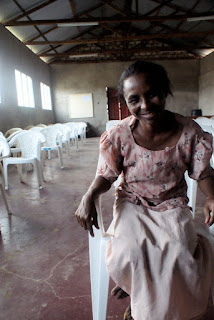- Turquoise sky and sea – as I flew from Nairobi out to Mombasa on the east coast of Kenya
- A flash of red blood, startling against sterile white – as we witnessed doctors performing free surgery on patients with cleft lip at Msambweni Hospital (I was there to document the event - don't worry, I won't show the blood...)
- Chalky brown earth, dried mud, sun-bleached trash scattered over the road – on the way to visit two WEEP (Women’s Empowerment Equality Program) Centers for women with HIV, one in Mombasa and one in Kibera slum near Nairobi
- Gray ink on my hands – joining the Kenyan custom of reading the paper every day; pitching an article to be published in The Star (one of Kenya’s national newspapers)
- Dappled green light – standing under tropical trees with our heads craned up, watching a man scale a 30-foot coconut tree while carrying a machete
- Blue ocean spray against my eyes – as I tore across the water on a jetski (driving for the first time)
- Bright red, green, yellow, and white beadwork of the Maasai – their handicrafts are everywhere
- The creamy brown of chai tea – served in every home we visit
- Silver storm skies – silhouetting the rustling palm trees
Another thing I’ve noticed about this country: Kenyans are always starting an organization or founding a non-profit or fixing a problem, in some way or another – practically everyone I meet is guilty of this innovation and initiative! I love it. It’s inspiring. In the U.S., we are so choked up with the mindset that “it’s all been done before” that few ever just take their dream and run with it.
Here, that happens every day. In Mombasa, I met one of the founders of Eco Village Africa, a young man not much older than me. In Nairobi, I’ve met countless nurses (such as the sweet but savvy Vickie Winkler, who founded HEART), and doctors (such as the amazing Dr. Onguti, who founded the organization that provides free cleft surgeries to the poor).
Women With HIV – Empowering Themselves
Yet another case in point: the women at the WEEP Centers across Kenya, which HEART founded to help empower women with HIV/AIDS to survive, regain their health, and learn a trade to achieve economic stability. These ladies are pulling themselves up from nothing – literally nothing. After visiting the WEEP Centers to obtain some information from the women for our records, I’ve now heard it all: a woman who was not told the reason when her husband died from HIV, so she never knew she was at risk; a woman who calmly told me that “my family left me to die alone”; woman after woman whose family or husband chased them out upon learning their HIV status, and who had no means of supporting themselves.
Now, these ladies are working with HEART staff to learn skills such as beading, sewing, tailoring, mosquito net-making, counseling, and business management. They are each developing their own small business plans, working their way up. They need support to get started with their businesses, but they have come such a long way. (Just look at the massive leaps in their CD4 counts – in one case from 2 to 355).
While I’m here in Kenya, my project with HEART is to gather and consolidate information from all the WEEP Centers, analyzing what’s working and what could be improved. So far I’ve only been to two of the Centers - but more to come.
Visiting Kibera slum today (reputedly the largest slum in sub-Saharan Africa, home to an estimated 1-2 million people) really proved to me just how great the need is. In Kenya, an estimated 1.5 million people are living with HIV, and around 1.2 million kids have been orphaned by AIDS. Slums such as Kibera overflow with HIV prevalence. Now I’ve seen the faces of these women and children – and I can tell you, the need is there.
 |
| A glimpse of Kibera slum - through a window |
Above: WEEP ladies working (sewing mosquito nets) in Mombasa
Now, these kids are in school; and the women are healthier, happier, and ready to start their businesses. If you’d like to donate to the program, please – do it. (You can contribute online here.) These are the women you would be helping – women I’ve met and hugged and shared tea with:
To give you an idea: $900 supports a woman and her children for 18 months while she gets treatment and plans her business. $10 can purchase a malaria prevention net. $30 can buy a uniform for an orphaned child – the WEEP ladies make the uniforms and sustain their families by selling the uniforms. $6,000 will help open a new center.
And if you’re wondering why the program is called WEEP: “Because I could hear HIV positive mothers weeping for their children.” –HEART founder, Vickie Winkler











Hi Lauren,
ReplyDeletewhat a wonderful and inspiring article, i believe this will reach many out there and answer the cry for these women.
Eric Mururu